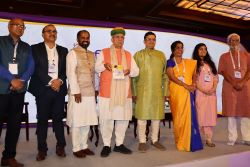India’s Cultural Economy: A Cornerstone of Sustainable Development Unveiled at the Maitri Cultural Economy Summit 2024
In a landmark event, the Maitri Cultural Economy Summit 2024 was convened recently at Le Meridian in New Delhi, attracting significant attention from policymakers, scholars, and cultural advocates. Organized by the Maitribodh Parivar, the summit has laid a critical foundation for recognizing the symbiotic relationship between culture and economic growth as a driving force for India’s future.
A Cultural and Economic Nexus
Union Law Minister Arjun Ram Meghwal and BJP national spokesperson Gopal Krishna Agarwal were among the distinguished speakers. The opening session was graced virtually by Union Minister of Road Transport and Highways, Nitin Gadkari, who emphasized cultural economic governance. Arjun Ram Meghwal traced India’s cultural economy back to ancient scriptures like the Vedas and Puranas, underscoring their historical significance and current relevance in economic policies.
Transforming Heritage into Economic Assets
India’s ambitious cultural projects, such as the Ram Temple in Ayodhya and the Baba Vishwanath Corridor in Varanasi, were highlighted as prime examples of integrating culture with economic strategies. Events like the Kumbh Mela, which significantly boost local tourism, trade, and employment, were cited as key contributors to India’s GDP.
"Integrating cultural heritage with economic strategies not only preserves our traditions but also fosters comprehensive progress," Agarwal remarked, pointing towards a future where cultural investments can yield substantial economic returns.
Sustainable Development through Cultural Prosperity
Maitreya Dadashriji, a key figure at the summit, shared a vision of sustainable development grounded in the synergy between cultural and economic realms. He articulated that leveraging cultural values and traditions could lead to both spiritual and economic prosperity.
Discussions at the event revolved around various themes, including festival and temple economics, sustainable ecosystems, and the economic impact of cultural activities. Eminent thinkers deliberated on how ancient cultural practices can be adapted to modern economic strategies to ensure holistic and sustainable growth.
Implications for India’s Future
As India continues to modernize, the cultural economy is emerging as an essential pillar of development. Initiatives that revive and promote India’s rich cultural heritage are not just about preserving the past but are about crafting a viable and prosperous future. By intertwining cultural values with economic development strategies, India aims to foster a robust and inclusive economic ecosystem.
This summit has ignited new dialogues and has set a precedent for future policy-making where culture is seen not as a relic of the past but as a dynamic catalyst for growth and prosperity.
For more information about upcoming events and initiatives by the Maitribodh Parivar, visit Maitribodh Parivar.
These discussions and initiatives mark a vital step towards recognizing the indispensable role of culture in economic advancement, setting the stage for a future where heritage and growth go hand in hand.
